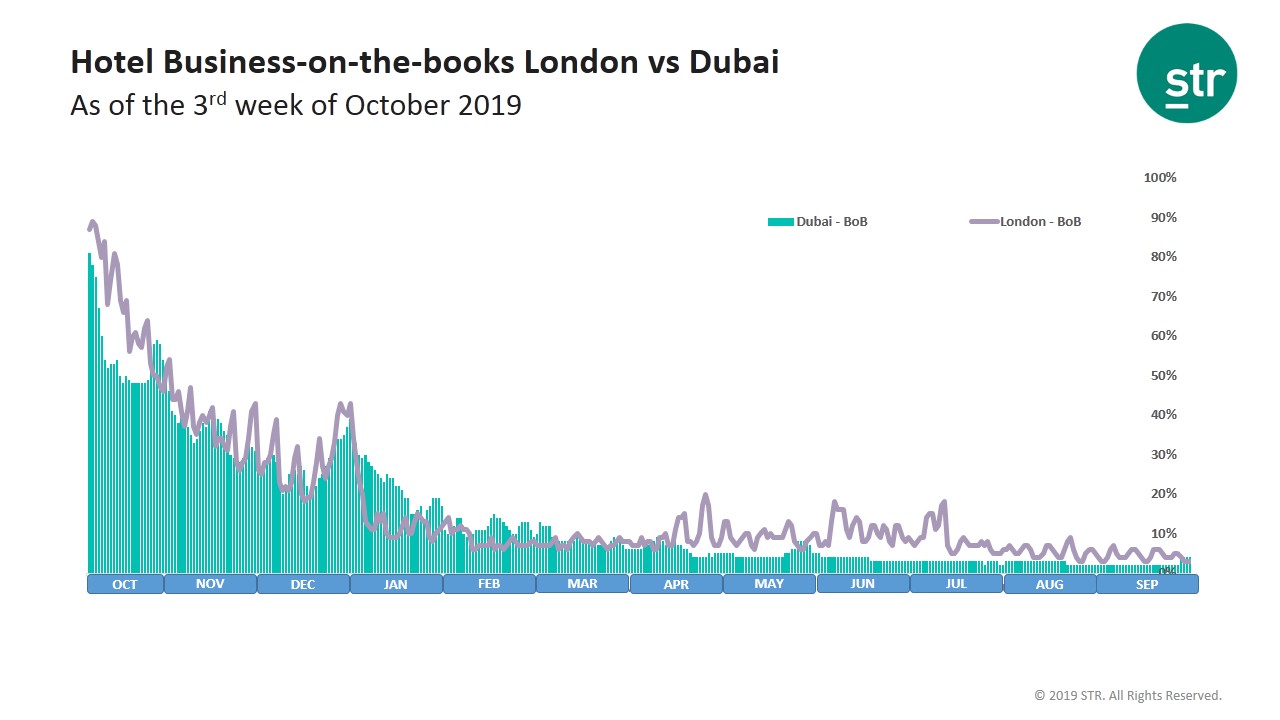Kostas Nikolaidis, Middle East and Africa executive for STR, takes a first glimpse at business on- the-books for London and Dubai as at the third week of October 2019

Steve Jobs said: “You can’t connect the dots looking forward; you can only connect them looking backwards.” We are undoubtedly in a better position to observe, analyze and understand life and, indeed, hotel performance in hindsight. Nevertheless, the hotel industry has always shown a desire to also develop the capacity for foresight – the ability to see the future unfold before it materializes into reality. Despite Dubai and London having their own Kostas Nikolaidis, Middle East and Africa executive for STR, takes a first glimpse at businesson- the-books for London and Dubai as at the third week of October 2019 distinct seasonality, business mix and trends, they generally operate at relatively high hotel occupancies, with Dubai closing 2018 at 75.3 percent occupancy, whilst London stood at 83.5 percent. The accompanying chart showcases some interesting findings. Firstly, Dubai’s forward-looking occupancy lags behind London for the months of October, November and December. A plethora of demand-inducing events take place in both cities during this time. Dubai plays host to a number of medical congresses, the Dubai Airshow, GITEX and more, while London is hosting events such as the Frieze Art Fair, the World Travel Market and the ATP World Tour. However, the trend reverses in Q1 which is traditionally the strongest quarter in terms of hotel performance for Dubai. London usually starts the year lethargically. To an extent, this can be attributed to its more corporate business mix and, arguably, less desirable weather conditions during the first three months of the year compared to Dubai. In addition, a spike in business is evident in London and Dubai for the period between Christmas and New Year as both cities tend to attract large numbers of leisure tourists during the festive season. Six months ahead and beyond, both cities are naturally still recording low demand as they are outside of the typical booking window for accommodation. The advance reservations in place usually consist of groups that are typically used to build an occupancy base in hotels. A considerable number of hotel bookings are nowadays relatively close to the arrival date, primarily due to the digital boom of the past few decades and the relative ease with which accommodation can be reserved through online or mobile channels; a behavior more frequently exhibited by the younger, more tech-savvy generations such as millennials. Data savvy hoteliers can already make use of forward-looking hotel data to optimize performance for their properties. Tourism Authorities, event organizers and Convention Visitor Bureaus, along with Destination Management companies, can use that data as an aid to better plan their future event calendars. Moreover, smart cities of the future will be able to leverage that data to better prepare for their future guests, plan their tourism flows and curate optimal tourism experiences for them. After all, when you can see the future, you can write your history!


















